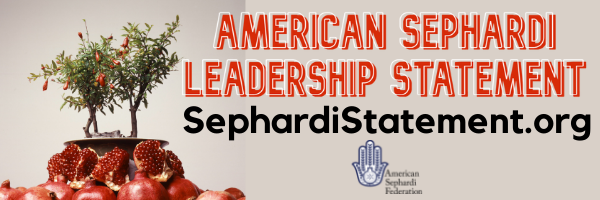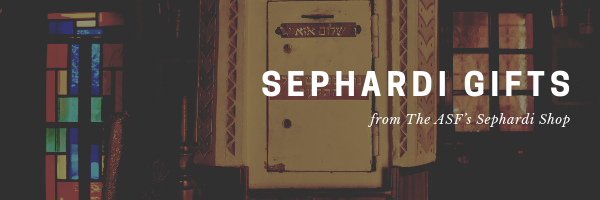In Memory of Professor Raphael Mechoulam, A”H, a Bulgarian-Israeli Sephardi Holocaust survivor and the “Father of Cannabis Research”
Sephardi World Weekly is made possible by Professor Rifka Cook, Maria Gabriela Borrego Medina, Rachel Amar, Deborah Arellano, & ASF VP Gwen Zuares!
Click here to dedicate a future issue in honor or memory of a loved one
Click here for upcoming events
✡️“Not Really Sephardic: Why Has Extremism Hijacked My Heritage?”
By Daniel Bouskila, The Jewish Journal
1st Day Cover of the 2007 stamp issued by Israel to honor Rabbi Chalom (Shalom) Messas and to salute the Moroccan Royal Family on behalf of Moroccan Jewry (in Arabic, French, English, and Hebrew)
(Photo courtesy of the Israel Philatelic Federation)
With political tension straining the fabric of Israeli society and potential violence looming over the horizon, the time ripe for the Classic Sephardi Judaism's voice of moderation and tolerance. R’ Daniel Bouskila laments how the “transformation of [Israel’s] Sephardic population led to the emergence of young rabbinic scholars who were ethnically Sephardic but ideologically entrenched in the ultra-Orthodox worldview.” Bouskila remembers a parallel time in the 1980s when the chief Sephardi Rabbi of Jerusalem, R’ Shalom Messas, responded to political violence in Israel by articulating a vision enlivened by the ‘tolerant, unifying spirit’ of Classic Sephardi Judaism: ‘I appeal to every member of our society saying: let us remove all causes of strife and division in our country, tear down the walls of separation that divide people, and expel baseless hatred from our society. Let us behave with respect and tolerance towards one another, and let us especially be careful to preserve the ethic of respecting human beings and human life.’”
~~~~~~~
Feature: Getting Ready for Pesah with Syrian Jewish Passover Traditions✨🙌✡️
(Photo courtesy of Avraham Shemi-Shoham/YouTube)
The American Sephardi Federation’s Institute of Jewish Experience helps us get in the mood for Passover by shining a light on the unique history and traditions of Syria’s Aleppian, aka “Halabi,” community. Images are provided by Halabi artist Avraham Shemi-Shoham, while the music comes from a Syrian Jewish school in Mexico.
~~~~~~~
🏝️“In search of Jewish heritage in Morocco’s southern oases”
By AFP, France 24
Isaaf Serraf with a group of children in the Mellah, Akka, Morocco, 1956
(Photo courtesy of the Diarna: Geo-Museum of North African and Middle Eastern Jewish Life)
HM King Mohammed VI’s commitment to Morocco’s Jewish heritage has assumed various forms in recent years, from revising educational curricula to restoring Jewish cemeteries and neighborhoods. In the most recent example of Morocco’s embrace of its Jewish past, archeologists from Israel, France, and Morocco came together to sift through debris in the Kingdom’s southern oases in order to better understand and document the country’s Judeo-Moroccan history. Israeli anthropologist Orit Ouaknine, herself from a Moroccan-Jewish family, emphasizes that the project “‘aims to study’ the region’s Jewish history ‘as an integral part of Moroccan society,’ while Saghir Mabrouk, an archaeologist from Morocco’s National Institute of Archaeology and Cultural Heritage, emphasizes the urgency of exploring ‘vulnerable spaces that are at risk of disappearing.’”
~~~~~~~
The American Sephardi Federation invites all individuals, communities, and organizations who share our vision & principles to join us in signing the American Sephardi Leadership Statement!
Please also support the ASF with a generous, tax-deductible contribution so we can continue to cultivate and advocate, preserve and promote, as well as educate and empower!
~~~~~~~
Exploring Sephardic Customs and Traditions
By Hakham R’Marc D. Angel, Ph.D
Over the centuries, Jewish communities throughout the world adopted customs that enhanced and deepened their religious observances. These customs, or minhagim, became powerful elements in the religious consciousness of the Jewish people. It is important to recognize that minhagim are manifestations of a religious worldview, a philosophy of life. They are not merely quaint or picturesque practices, but expressions of a community’s way of enhancing the religious experience. A valuable resource for Sephardim and Ashkenazim alike.
By Rabbi Dr. Marc D. Angel
This unique Sephardic Passover Haggadah will be valued by Sephardim and Ashkenazim alike. Hakham Rabbi Angel provides a new, readable translation of the classic Haggadah text. Added to it are some selections in Judeo-Spanish as well as the popular “Bendigamos” blessing after meals.
This special edition of the Haggadah includes a running commentary, drawn from the teachings of Sephardic sages through out the generations, with insights from such Sephardic luminaries as Rabbis Moses Maimonides, Yitzhak Abravanel, Hayyim Y. D. Azulai, Benzion Uziel, Hayyim David Halevy and many others, ancient and modern. The Haggadah also includes a number of Sephardic customs which will enrich anyone’s Passover Seder.
~~~~~~~
Upcoming Events or Opportunities
The American Sephardi Federation, in partnership with Center for Jewish History, Kulanu, Project Shema, Kahzbar, Be’chol Lashon and Jewish Multiracial Network presents:
The Hidden Jews of Ethiopia
Film Screening and Discussion
Nafkot – Yearning, a new film by Dr. Malka Shabtay
The Hidden Jews of Ethiopia, a new book by Dr. Marla Brettschneider
Sunday, 2 April at 4:00PM EST
(Followed by a reception)
At the Center for Jewish History
(Tickets: In-person $15)
Sign-up Now!
Sponsorship opportunities available:
~~~~~~~
TriBeCa Synagogue presents:
Mexican Jewish Film Festival 2023
(First Edition)
A retrospective on Mexican films: directed, created, written, acted or produced by Mexican Jews
2-5 April 2023 | TriBeCa Synagogue
49 White Street, New York City
Sign-up Now!
(Please use a promo code ASF2023 to receive a special 50% off discount)
Sponsorship opportunities available
~~~~~~~
The American Sephardi Federation presents:
Sephardic Culinary History with Chef Hélène Jawhara-Piñer
“Cecilia Cardosa Matza and Sweet Lamb for her Passover Dish”
Special Passover cooking class
Sephardi Culinary History combines chef and scholar Hélène Jawhara-Piñer’s fascination with food studies and flair for creating delicious cuisine. Join along as she cooks Sephardic history!
Monday, 3 April at 12:00PM EST
(Tickets: Zoom $15)
Sign-up Now!
ASF Broome & Allen Fellow Hélène Jawhara Piñer earned her Ph.D in History, Medieval History, and the History of Food from the University of Tours, France.
Chef Hélène’s primary research interest is the medieval culinary history of Spain through interculturality with a special focus on the Sephardic culinary heritage written in Arabic. A member of the IEHCA (Institute of European History and Cultures of Food), the CESR (Centre for Advanced Studies in the Renaissance), and the CoReMa Project (Cooking Recipes of the Middle Ages), Chef Hélène has lectured at Bar-Ilan University (in collaboration with the Stali Institute and the Spanish National Research Council (CSIC): “El patrimonio culinario judío de la Península Ibérica a través de un manuscrito del siglo XIII. Ejemplos de la pervivencia de recetas en la cocina de los sefardíes de España y de Marruecos,” 2018), as well as at conference of the Association Diwan (“Reflections on the Jewish heritage according to the Kitāb al-ṭabīẖ,” 2015), IEHCA of Tours (“Jews and Muslims at the Table: Between coexistence and differentiation: state of affairs and reflections on the culinary practices of Jews and Muslims in the Iberian Peninsula and in Sicily from the 12th to the 15th century,” 2017), and Society for Crypto-Judaic Studies (“The hidden Jewish culinary heritage of the Iberian Peninsula through a manuscript of the 13th century. Examples of the provenance of some recipes in Venezuelan and Colombian cuisine,” 2017).
Last May, Chef Hélène hosted “Shavuot in the Sephardic Kitchen: Bread of the Seven Heavens,” one of the most popular sessions of the Great Big Jewish Food Fest. An administrator of the over 11,000 member Sephardi Cuisine! group on Facebook, her recipes have appeared in the Sephardi World Weekly, Sephardi Ideas Monthly, Tablet Magazine, The Forward, and S&P Central’s Newsletter.
Order your copy of “Sephardi: Cooking the History. Recipes of the Jews of Spain and the Diaspora, from the 13th Century Onwards”
(recently ranked “#1 New Release in Spanish Cooking, Food & Wine”).
Sponsorship opportunities available:
~~~~~~~
The Belzberg Program in Israel Studies at the University of Calgary and the Schusterman Center for Israel Studies at Brandeis University. With the collaboration of the American Sefardi Federation, Centro Sefarad Israel, and the International Network for Jewish Thought present:
Sephardi Modernities Seminar Series, 2023
Join us as we explore the relationship between our narratives about the past and the future to which we aspire. The ways in which scholars approach the stories, events, characters, and historical processes of the Sephardi/Levantine past are inevitably guided by values, by their moral and political beliefs. Which elements of the past do they strive to preserve, reclaim and grant continuity? What are they trying to say about a potential future? Which stories become part of canonized history, and which ones are dismissed as mere anecdotes? Which theoretical, social, political, and cultural frameworks do they wrestle with, and which do they seek to advance?
On Zoom
(Registration is required for each session)
18 April at 12:00PM EST
‘Modernity’ and ‘Tradition’ on the Move: Spanish Moroccan Jews and their Diasporas
Aviad Moreno, Ben-Gurion University of the Negev, in conversation with Angy Cohen, University of Calgary
Sign-up Now!
9 May at 12:00PM EST
Sephardi Musical Modernities: Listening to the Past in the Future
Edwin Seroussi, Hebrew University of Jerusalem
Yair Dalal, Composer, violinist, oud player, singer, and teacher
Sign-up Now!
Throughout this year’s series we will discuss the future invoked by each way of looking at the past, the political agendas of historical research, and the values that unavoidably guide scholastic inquiry. Topics include the transmission of narratives among collectives and among researchers, ownership of archives, encounters with the past, the academic legitimacy of certain topics and collectives, vehicles of memory (music, oral history, proverbs, etc.) and the construction of historical narratives.
Organized by Dr. Angy Cohen, Inaugural Hy and Jenny Belzberg Postdoctoral Associate in Israel Studies, Department of Anthropology and Archaeology at the University of Calgary, and Dr. Yuval Evri, Assistant Professor of Near Eastern and Judaic Studies on the Marash and Ocuin Chair in Ottoman, Mizrahi, and Sephardic Jewish Studies, Brandeis University.
~~~~~~~
ASF Broome & Allen & ADL Collaborative for Change Fellow Isaac de Castro presents:
Entre Diasporas: Telling the Latin-American Jewish story. Contando la historia judía latinoamericana
Tell your story. Cuenta tu historia.
We’re looking for first-generation Latino Jews in the United States who immigrated because of political and social turmoil. Jews of Sephardic descent from Colombia, Cuba, and Venezuela that now reside in the Miami area will be given priority, but others are welcome to apply as well.
Fill out this form to be considered as an interviewee for this project. After you’ve submitted, we will be in touch promptly to set up a preliminary phone call.
Click here for more information.











